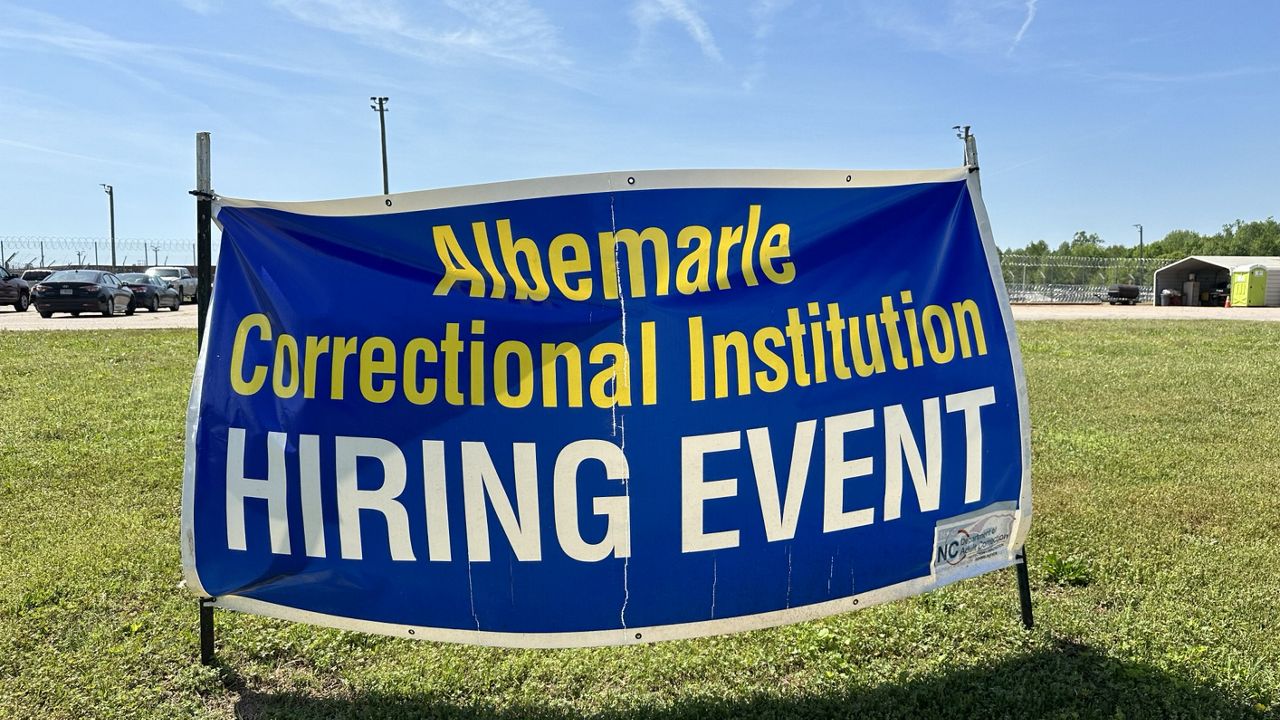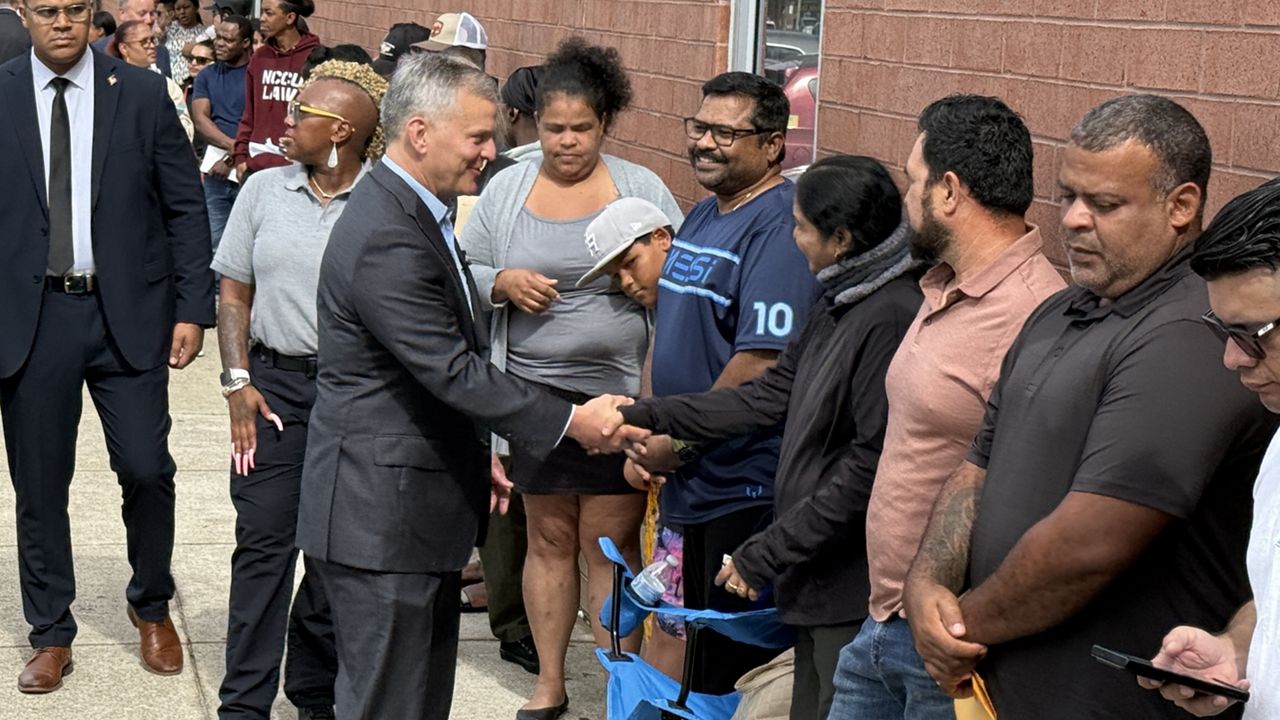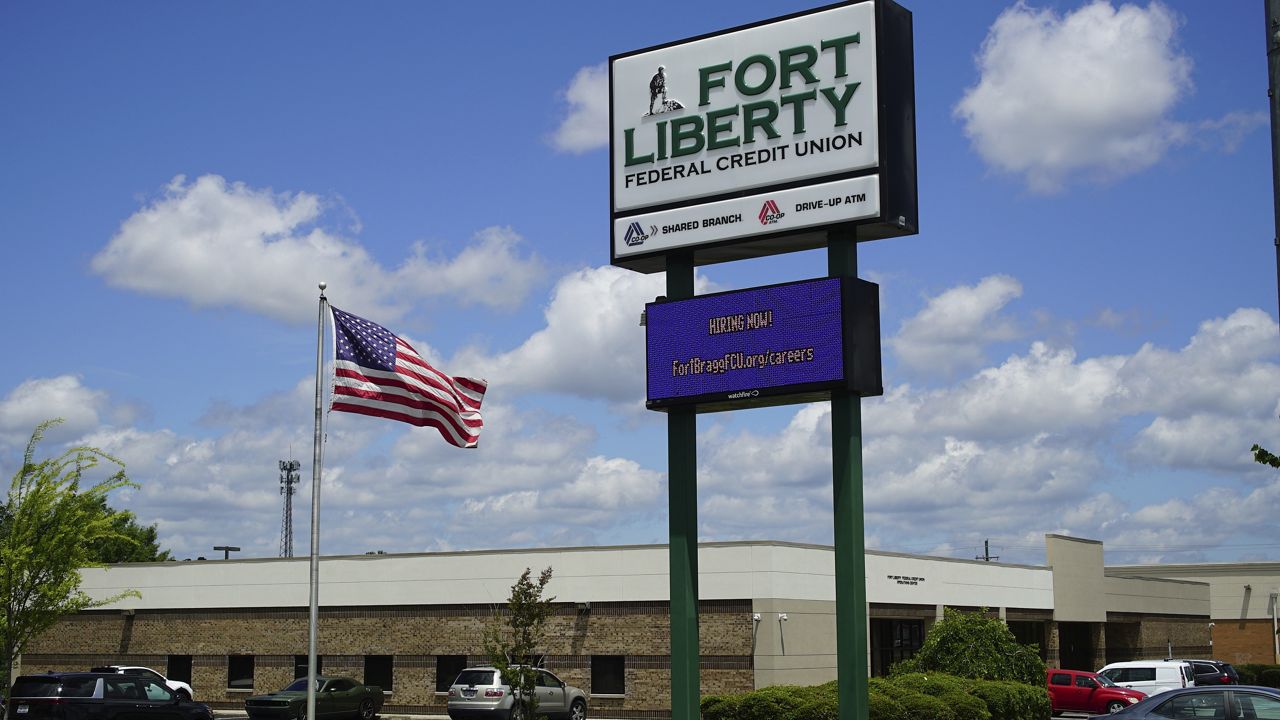STANLY COUNTY, N.C. —Layers of fence and razor wire surround Albemarle Correctional Institute. Inside the fence, well-manicured lawns surround the single-story brick buildings that make up the medium security state prison.
At the driveway entrance to the prison there are tall red, white and blue flags on either side, the kind you might see at a used car dealership. “Now hiring,” the flags read.
Visitors to the state prison must first pass through a gatehouse, a small brick box with solid steel doors. Security is tighter than the airport. No phones or tobacco are allowed inside. Take off your shoes, go through a metal detector and another scan. Everyone gets a pat-down before walking through another steel door, unlocked by a guard in a control booth. A long sidewalk leads up to the main building.
It’s quiet, almost peaceful. The prison sits next to the Stanly County Airport. It would just be a mile’s walk through the woods to Badin Lake.
There are three housing units at Albemarle, named North Carolina lakes: Badin, Falls and Tillery. Each holds 272 inmates. The medium security prison in Stanly County is built to house more than 850 inmates, but that number is now more like 600. The prison just doesn’t have enough officers to keep all the units open.
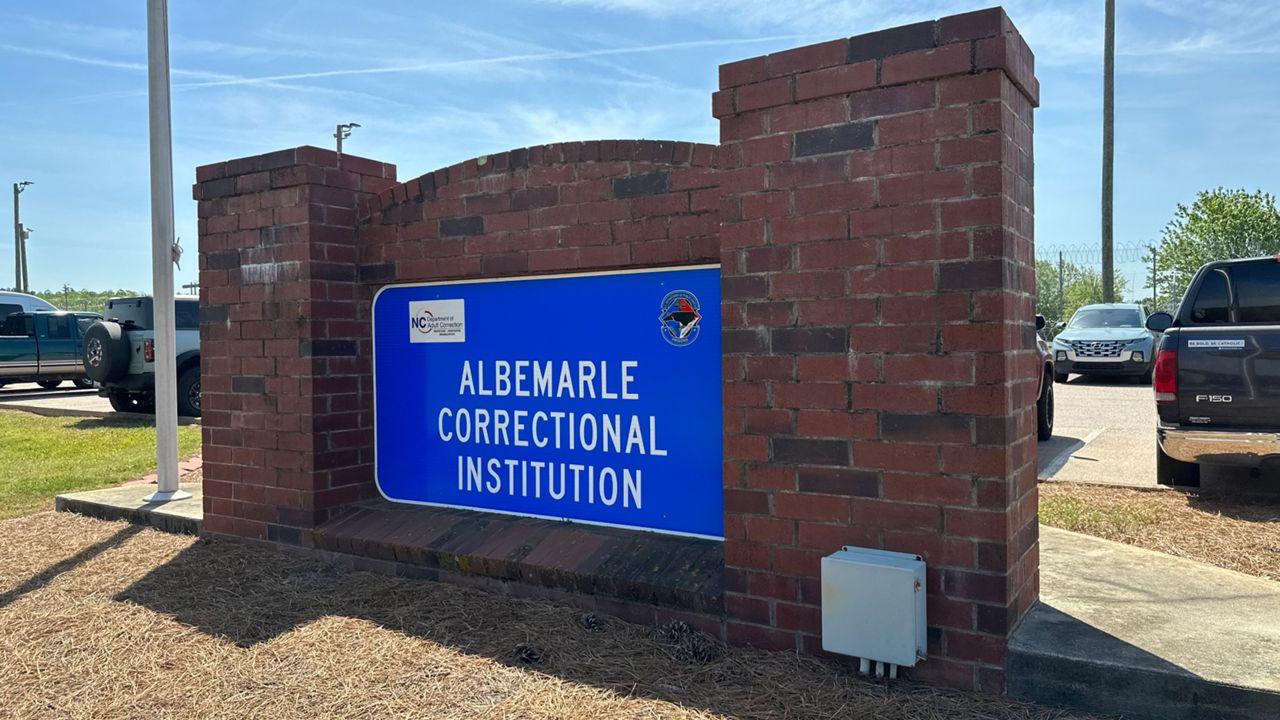
The prison, about an hour east of Charlotte near Uwharrie National Forest, is supposed to have 160 correctional officers, according to the North Carolina Department of Corrections. As of March, the prison had 75 of those jobs actually filled, data from the department shows.
Statewide, the Department of Corrections has a 42% vacancy rate for correctional officers. Of the 8,683 officer jobs in the department, the data from the state shows 5,032 of those were filled last month.
Of the 57 North Carolina prisons, 31 have had to close units and reduce the prisoner population because of staffing problems, according to data from the Department of Corrections.
The staffing problems have grown since the beginning of the pandemic. In April 2020, the statewide vacancy rate for correctional officers was about 15%, according to the department’s data.
The staff shortages at North Carolina prisons are part of an economy-wide national trend. Every government agency and private business is having trouble with staffing. That problem is particularly acute in prisons around the country, both state-run and federal.
“It was always hard to fill prison jobs,” said Albemarle Warden Kenneth Diggs. “But we went critical after COVID.”
Sitting at the head of a conference table in his office at the prison, Diggs said staffing changes every week. They have been making it work despite the shortage in correctional officers and other staff. He said officers work extra shifts, they’ve changed the roles for some other staff, brought in contractors and reduced the inmate population.
The goal, Diggs said, has been to keep both inmates and staff safe while they continue to offer job training and rehabilitation programs.
The men and women locked up in North Carolina’s prisons say they feel the day-to-day impacts of the staffing shortages.
Not having enough guards makes everything more complicated, said Shawn Horskins, who is serving a life sentence for murder. He said sometimes food arrives late or cold, at times not properly prepared.
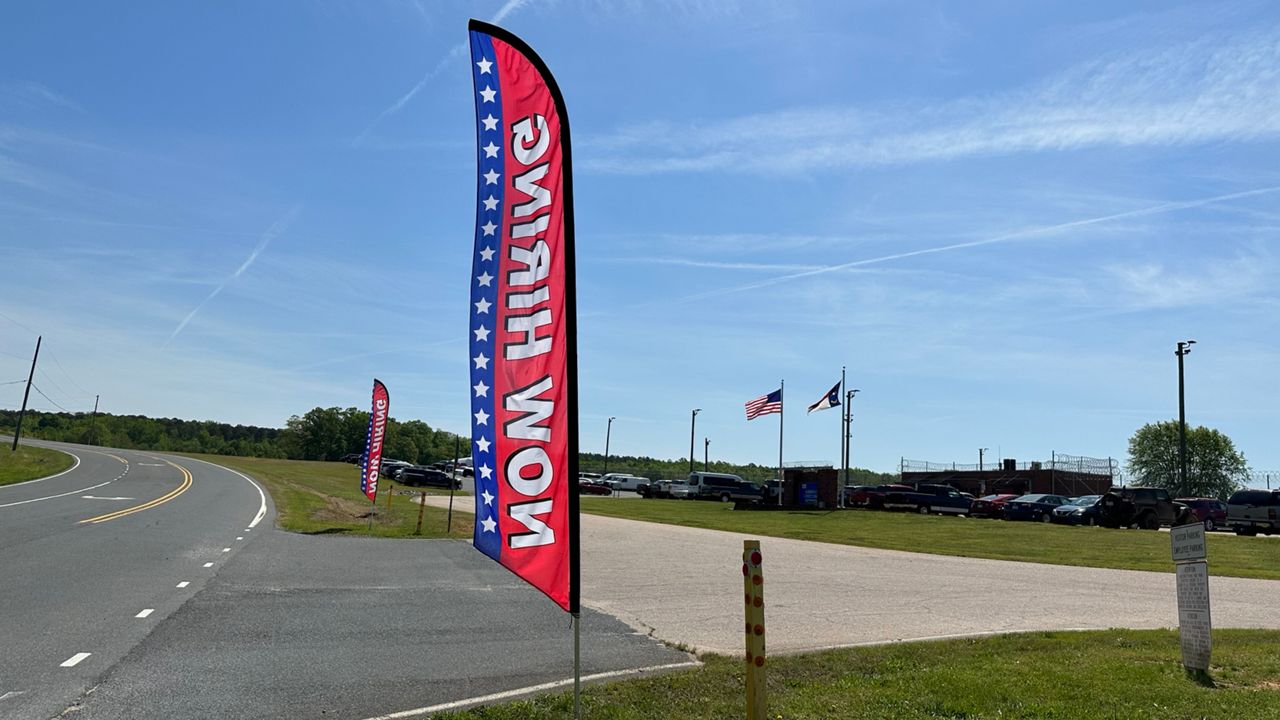
“The officers they do have are trying to work more hours than normal,” he said in a phone interview from Nash Correctional Institution. “They don’t really care what’s going on.”
Horskins, 35 has been in prison since he was found guilty of first-degree murder in May 2012. He was a soldier at Fort Lee in Virginia when he went to Elizabeth City, North Carolina, to celebrate New Year’s. He was convicted of shooting and killing a man shortly after midnight on New Year’s Day 2010.
He’s seen the ebb and flow of correctional officer staffings during his decade-plus in North Carolina prisons. The prison in Nash County has better staffing than most in the state, with a correctional officer vacancy rate of about 28%, according to state data.
“I’ve seen a lot of people get stabbed, jumped on,” Horskins said. "It could be drugs or gang related, stuff like that.”
“You have to be able to defend yourself,” Horskins said.
Prison officials dispute that staff shortages have made the prisons less safe.
In fact, the number of reported assaults among inmates and on staff has been steadily declining in recent years, according to data from the Department of Corrections.
Horskins transferred to Nash Correctional to join a seminary program and get his bachelor’s degree, one of the flagship programs in the North Carolina prison system. Once he graduates, Horskins will take on a role as a preacher and counselor to other inmates. But that program too has been complicated because of the staff shortages.
“It’s like a day-by-day thing. We don’t know if they’re going to call us or not going to call us to go to class,” he said.
Sandra Hardee is the executive director for North Carolina Citizens United for Restorative Effectiveness (known by the acronym NC-CURE), a prisoner advocacy group.
She said she is in regular contact with inmates across the state. They’re telling her that guards in some prisons are not making rounds like they should be.
“Guards have to work long shifts and extra shifts, which is terrible for morale and terrible for the quality of guarding they have to do, so they become irritable,” Hardee said. “They’re not present like they should be.”
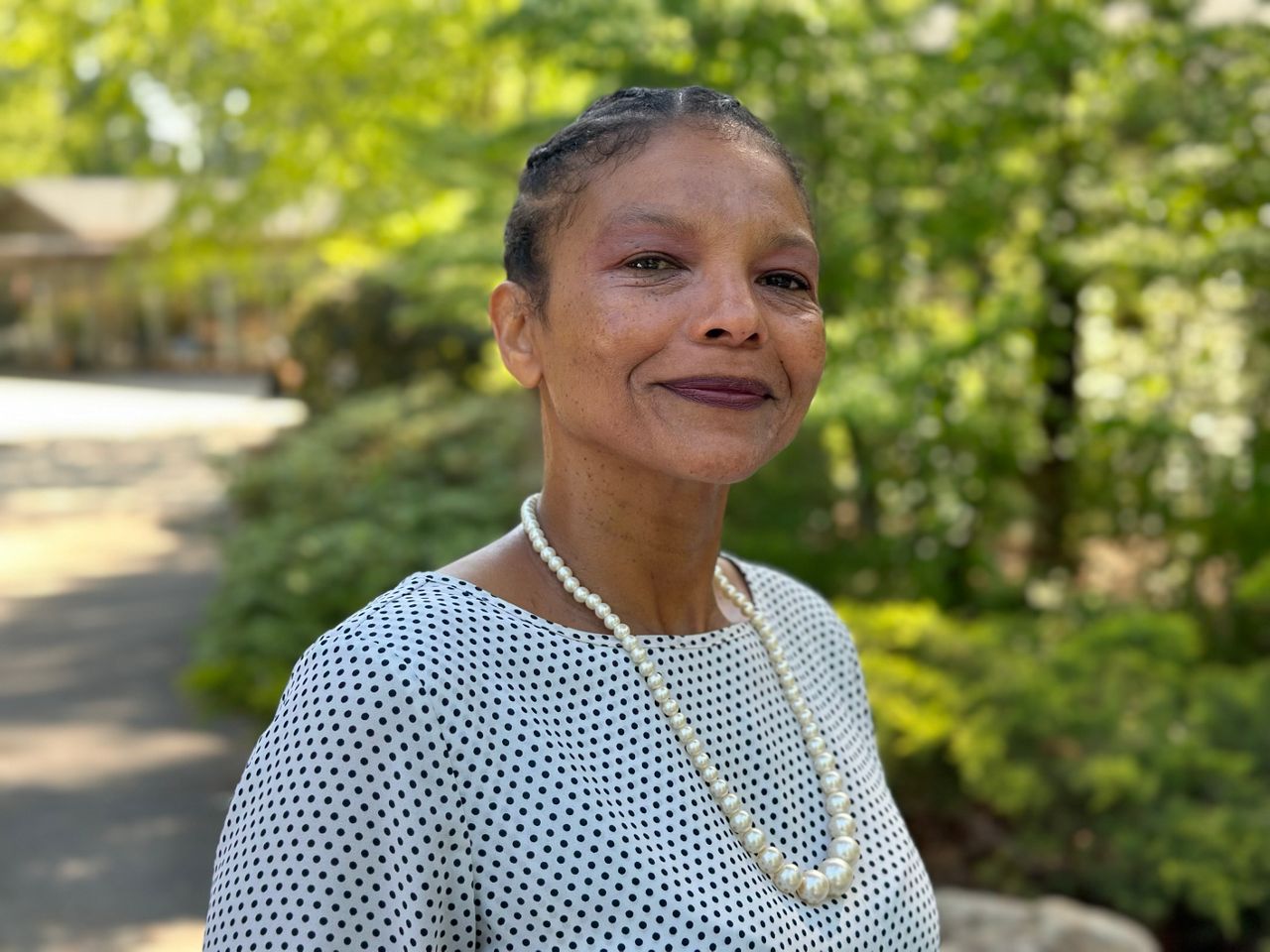
April Barber, 47, was released from prison on March 24, 2022. She served more than 31 years on two consecutive life sentences for murder.
“When they don’t have a lot of staff, it’s bad on both them and us,” she said. “We cannot get the proper things we need to better ourselves. Even just the simple things like a hair dryer or a roll of toilet paper.”
She said when the prisons are short staffed, it cuts down on the time inmates are allowed to go outside.
“If something happens, like a medical emergency, if someone needs assistance, if an argument or a fight breaks out, or if something happens to the staff, if the staff gets sick, it puts everyone’s life, safety and well being in danger,” she said.
Barber said in her last years in prison, she saw the staff shortages get worse.
“You’re supposed to be allowed to go outside for one hour a day, and there have been several days on end where we were not allowed outside,” she said, echoing what Hardee said she had heard from other inmates. “It’s always due to lack of staff. That’s always their go-to: lack of staff.”
Over Barber’s three decades in North Carolina prisons, she spent more than 18 years in the main women’s prison in Raleigh for murder committed as a juvenile. After that, she was in Troy Correctional Facility, and then finished her time cycling through several medium-security prisons, she said.
Standing at the intersection of two long hallways in the Falls unit at Albemarle Correctional Facility, Correctional Officer Joshua Dennis doesn’t look at the person he is talking to. He keeps his eyes focused through the thick glass panes of an inmate dorm, scanning across the room.
Dennis has been a correctional officer for 12 years. He’s now a manager for this part of the prison.
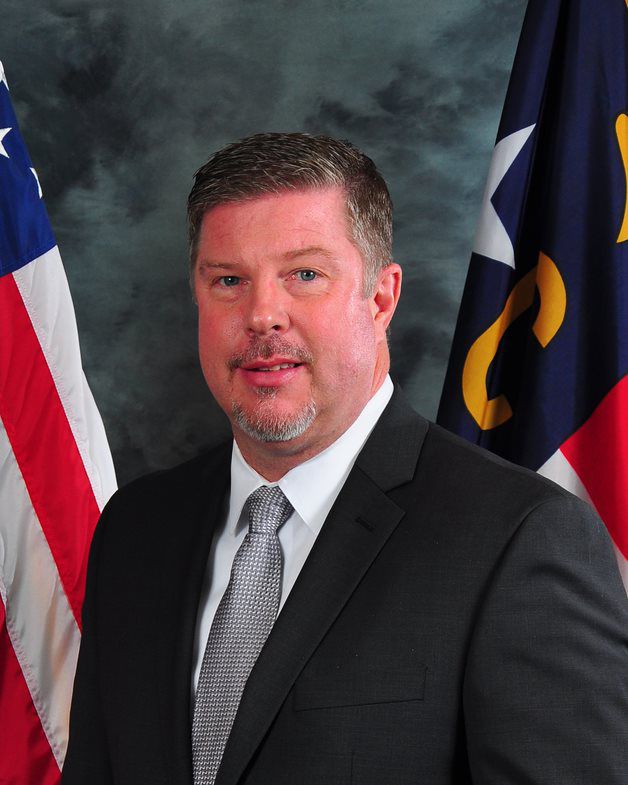
On the other side of the thick glass and steel doors, dozens of men sit around tables or watch television. They all wear the signature taupe uniforms of North Carolina’s medium security inmates.
The officers count each inmate six times a day. Inmates are fed three times a day, Dennis said. The unit is self-contained, with its own recreation yard, barbershop and library. They do weekly drug and alcohol programs.
“We’re a big family here,” Dennis said. “They work days off, they work extra days.”
He pointed to a coworker sitting at a control panel just above him. She was supposed to be off today, he said, but still came in to work an extra shift.
“Prison jobs are not for everybody. That’s just the reality,” said Diggs, the warden at Albemarle. “This is old-school hours and work.”
Diggs has worked for the state Department of Corrections for more than 30 years, starting as a correctional officer in 1991.
He said recruiting has always been hard. He said he even hesitated before working at a prison. “It’s just the stigma of working at a prison,” he said.
On top of that, he said, the work can be dangerous. There are violent criminals in these prisons. “It’s unnerving. It takes some getting used to,” he said.
The state has increased pay and bonuses for correctional officers and other critical prison staff, said Mike Scarborough, the acting south central regional director for the corrections department. They also get state benefits.
The goal is to recruit more people into corrections jobs and hang on to the people they already have.
When it comes to attracting workers, the warden said, “we compete with everybody.”
Coming out of the pandemic, employers started offering higher wages for work that was easier than being a prison guard. People could work from home. The North Carolina Department of Corrections saw an exodus.
Between April 2020 and March 2023, the department lost more than 2,700 correctional officers, according to data provided by the Department of Corrections. The statewide vacancy rate for officers went from 15% to 43%.
Scarborough said he and the top leadership in the department have focused on staff and making their working conditions better. Beyond increasing pay, he said they’ve been improving employee break rooms, making sure they have things like refrigerators. They got the officers new vests that keep them cooler during the hot summer months.
The department is also working to put air conditioning in every prison in the state with new funding from the General Assembly.
At Albemarle, Diggs said they have changed some things around to make sure they can keep educational and rehabilitation programs open. That includes making people like case managers also do the job of guards so they can spread out their resources more.
“I could say, ‘we don’t have the staff,’ and make it easier on us,” he said. “We’ve taken the harder route.”
Albemarle is the first medium-security prison in North Carolina to offer the R-STEP reentry program.
The program helps inmates with all the issues they will face when they get out, including things like getting an ID, a bank account and finding a job.
Cordelia McBride runs the R-STEP program at Albemarle, where she’s worked for 16 years. She said they have employers come to the prison so they can interview inmates shortly before they’re released, similar to a job fair.
“That way they have a job as soon as they get out,” she said.
Diggs said he also brought back retirees to work part time in lower-impact areas of the prison where they still need a correctional officer.
To Diggs’ credit, people who have been incarcerated and advocates like NC-CURE, say Albemarle is known as one of the better-run prisons in North Carolina.
The North Carolina Department of Corrections continues to try to boost its ranks. But with so much competition for workers, it’s a tall order.
“When the economy struggles, we do well with hiring,” said Scarborough, who also started as a correctional officer almost 30 years ago and has risen in the ranks.
For him, it comes down to the mission of running a prison: “They know when they lay their head down at night, they’re safe.”





